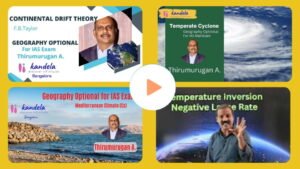Geography Optional for UPSC Civil Services Examination
“Geography for UPSC Civil Services Examination: Physical and Human Systems” is a comprehensive course that covers the various aspects of geography that are relevant for the UPSC Civil Services Examination. The course is designed to provide students with a thorough understanding of the physical and human systems that shape our planet and how they interact with each other.
The course begins with an introduction to physical geography, including topics such as geomorphology, climatology, oceanography, and biogeography. These topics will provide students with an understanding of the Earth’s physical processes and how they shape the natural environment.
The course then moves on to human geography, which includes topics such as economic geography, social geography, political geography, and population geography. These topics will provide students with an understanding of the ways in which human societies interact with and shape the natural environment.
The course also covers regional planning and development, which will provide students with an understanding of how to plan and develop regions in a sustainable and equitable manner. Additionally, the course covers geographical techniques and remote sensing, which will enable students to use cutting-edge technology to analyze and understand the Earth’s surface.
The course also includes map work and cartography, which will provide students with the skills they need to read, analyze and create maps. Finally, the course covers current affairs and environmental issues, which will help students understand the most pressing issues facing the planet today and how they can be addressed.
Overall, “Geography for UPSC Civil Services Examination: Physical and Human Systems” is a comprehensive and challenging course that will provide students with a thorough understanding of the physical and human systems that shape our planet and the skills they need to address the most pressing issues facing the planet today.
